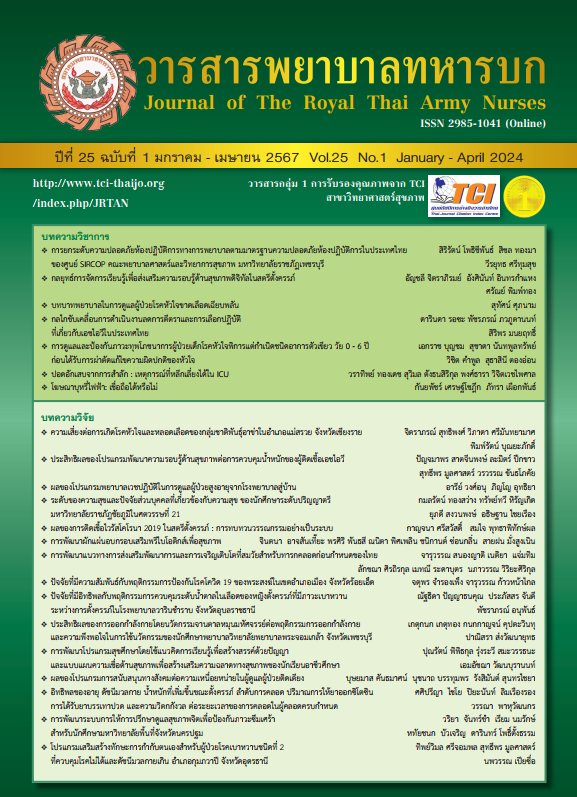Level of Happiness and Factors Associated with Happiness among 21st Century Undergraduate Students, Chaiyaphum Rajabhat University
Keywords:
Level of Happiness, Factors Associated with Happiness, studentAbstract
This research aimed to investigate the happiness levels, the factors related to happiness, and personal factors associated with the happiness of undergraduate students at Chaiyaphum Rajabhat University in the 21st century. The study sampled 386 undergraduate students from the regular undergraduate programs at Chaiyaphum Rajabhat University in the 2020 academic year, encompassing students from years one to four. The participants were selected through random sampling.
The research utilized two questionnaires: a personal information questionnaire and the Thai Mental Health Indicator-55 (TMHI-55) questionnaire developed by the Department of Mental Health. The TMHI-55 questionnaire consists of 55 items and employs a 4-point Likert scale. Data analysis was performed using various statistical methods, including percentages, means, standard deviations, t-tests, one-way ANOVA, and Pearson correlation coefficients.
The research findings indicated that 84.2% of the students reported lower levels of happiness compared to the general population. Furthermore, there were significant differences in happiness levels among students based on their academic year, faculty of study, and average monthly family income. The analysis also revealed a statistically significant negative correlation between academic year and happiness (r = -0.143, p<.01).
In summary, this study aimed to explore the happiness levels and factors associated with the happiness of undergraduate students at Chaiyaphum Rajabhat University in the 21st century. It found that happiness levels varied based on factors such as academic year, faculty of study, and family income, with a significant negative correlation between academic year and happiness.
Downloads
References
Promsao K. The Heart of Higher Education: A Call to Renewal. Bangkok: Suan yern mema; 2014. (in Thai)
Srikhamsuk Seito A., Woraharn W. and Senarak W. Nursing Students’ Happiness. Bachelor Degree of Nursing, Khong Kaen University. Nursing and Health Journal. 2011; 34 (2):70-9. (in Thai)
Depuy HJ. The general well-being schedule in a measuring health: a guide to rating scale and questionnaires. New York: Oxford University; 1977.
Sonveerawong J. et. al. Happiness of Students of Walailak University. Songkhla Nakarin Medical Journal. 2017; 34 (5):269-79. (in Thai)
Mongkol A, Wongpiromsarn Y, Tungsaree T, Huttaphanom W, Romsai P, Chutha W. The development and testing of Thai mental health indicator (version 2007): Department of Mental Health, Ministry of Public Health. Printed Agricultural Cooperative Federation of Thailand. Bangkok; 2009. (in Thai)
Ekakul T. Research methodology in behavioral science. and social sciences. Ubon Ratchathani: Ubon Ratchathani Rajabhat Institute; 2000. (in Thai)
Tongsawang K. Happiness of Nursing Students of Faculty of Nursing, Chaiyaphum Rajabhat University. Journal of The Royal Thai Army Nurses. 2022; 23(2): 302-11. (in Thai)
Kasemsuk K., Wichainate K. A study of the Happiness of Air Force Student Nurses. Journal of The Royal Thai Army Nurses. 2017; 18(3): 228-35. (in Thai)
Luonprom N. and Kensila U. Factors related to the happiness level of nursing students. Ratchathani University Udon Thani Campus. Academic Conferences and National Research Presentations Rajathanee Academic Conference No. 3, “Innovations that Transform Global Society”, Ubon Ratchathani. 2018.
Onsri P, Chaleoykitti S. Nursing learning provision for happiness: role of teacher and learners. Journal of The Royal Thai Army Nurses. 2013; 14(1): 8-16. (in Thai)
Phaneukram J. Factors Related to Happiness of Undergraduate Students of Suranaree University of Technology. 2016. Research Report, Suranaree University of Technology. 2017. (in Thai)
Downloads
Published
How to Cite
Issue
Section
License
Copyright (c) 2024 Journal of The Royal Thai Army Nurses

This work is licensed under a Creative Commons Attribution-NonCommercial-NoDerivatives 4.0 International License.
บทความหรือข้อคิดเห็นใดใดที่ปรากฏในวารสารพยาบาลทหารบกเป็นวรรณกรรมของผู้เขียน ซึ่งบรรณาธิการหรือสมาคมพยาบาลทหารบก ไม่จำเป็นต้องเห็นด้วย
บทความที่ได้รับการตีพิมพ์เป็นลิขสิทธิ์ของวารสารพยาบาลทหารบก
The ideas and opinions expressed in the Journal of The Royal Thai Army Nurses are those of the authors and not necessarily those
of the editor or Royal Thai Army Nurses Association.






